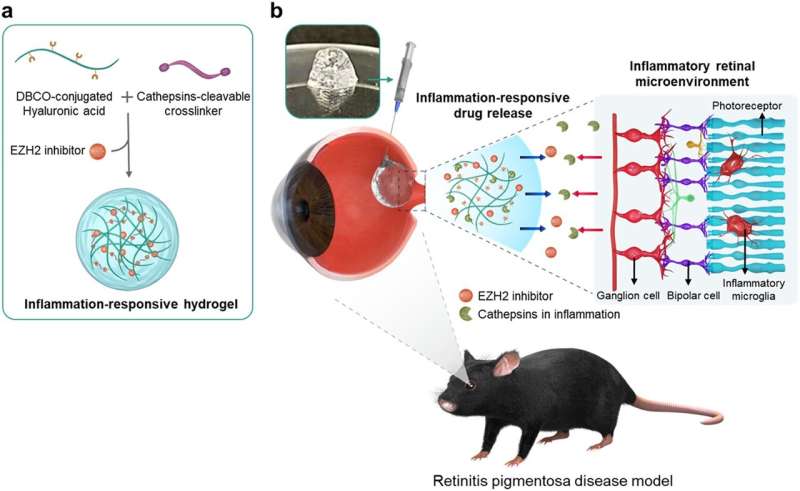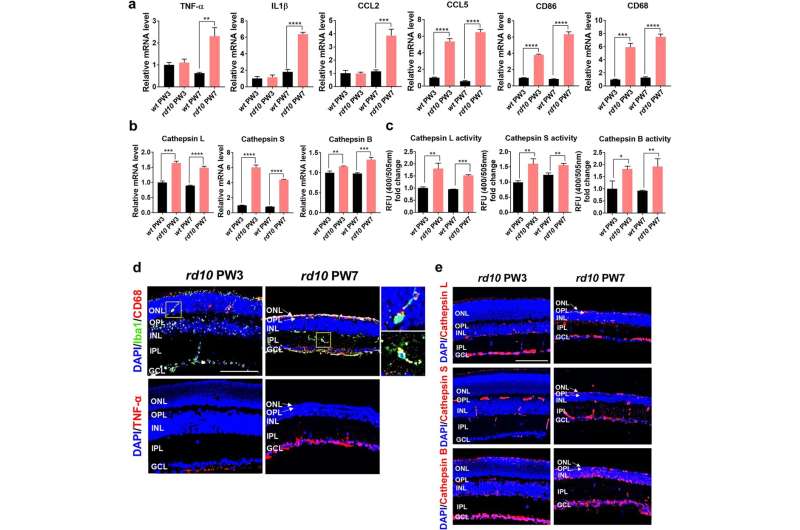This article has been reviewed according to Science X's editorial process and policies. Editors have highlighted the following attributes while ensuring the content's credibility:
fact-checked
trusted source
proofread
New treatment developed to dramatically slow down the progression of blindness-causing retinal diseases

A research team has successfully incorporated anti-inflammatory drugs into a hydrogel to suppress inflammation in the retina and effectively deliver the drugs to the inflamed area.
Age-related macular degeneration and retinitis pigmentosa are incurable eye diseases that cause blindness due to the gradual damage of photoreceptor cells, which convert light into biological signals in the retina, the light-sensitive tissue at the back of the eye.
Age-related macular degeneration is a condition that damages the macula, the central part of the retina, and is the number one cause of blindness in people over the age of 65. Retinitis pigmentosa, on the other hand, is a genetic disorder that causes gradual death in the photoreceptor cells in the retina and affects about one in 4,000 people worldwide, initially causing night blindness but eventually leading to vision loss.
Currently, there is no effective cure for either disease, and one of the treatments is to inject anti-inflammatory drugs into the eye to slow down the degree of retinal damage. However, these injections only work for as long as the drug remains in the eye, requiring patients to visit a clinic for intraocular injections every four to 12 weeks, depending on how long the effect of the drug lasts.
For the first time, the team utilized a substance that inhibits the inflammatory factor EZH2, which contributes to retinal degeneration, along with an anti-inflammatory agent. When mice with retinal degeneration were injected with the anti-inflammatory drug, the progression of retinal degeneration slowed down. The paper is published in the journal npj Regenerative Medicine.
The researchers have successfully developed a hydrogel that slowly degrades upon encountering the enzyme cathepsin, which is typically overexpressed in inflammatory environments, to deliver anti-inflammatory drugs. When the team's drug-loaded inflammation-responsive hydrogel was injected into the eyes of mice suffering from retinal degeneration, inflammatory factors in the retina were reduced to approximately 6.1%.
The team also found that the protective effect on photoreceptor cells, which are known to be destroyed by retinal degeneration, was about four times higher than in the control group, effectively delaying vision loss.

Notably, the hyaluronic acid-based hydrogel, which has similar mechanical and optical properties to the vitreous humor of the eye, allows for different rates of hydrogel degradation in each patient, minimizing the need for repeated injections.
This newly developed technology is expected to reduce the economic burden and the risk of accidents during outpatient visits for patients with difficulty in mobility due to visual impairment. Additionally, for patients in the early stages of symptoms, reducing the frequency of hospital visits can alleviate inconvenience in daily life.
The team included Dr. Maesoon Im of the Brain Science Institute, together with Prof. Seung Ja Oh of Kyung Hee University and Prof. Kangwon Lee of Seoul National University,
"For future commercialization, we plan to digitize the amount of drug and hydrogel used, as well as the treatment period, according to the progression of the disease. We also intend to assess the long-term stability of the drug delivery system," said Dr. Maesoon Im of the Korea Institute of Science and Technology.
"In addition to the retinal degenerative diseases, we will investigate inflammation levels in other retinal diseases to see if our inflammation-responsive drug delivery system would work on those conditions," said Prof. Seung Ja Oh.
More information: Hyerim Kim et al, Effective protection of photoreceptors using an inflammation-responsive hydrogel to attenuate outer retinal degeneration, npj Regenerative Medicine (2023). DOI: 10.1038/s41536-023-00342-y




















